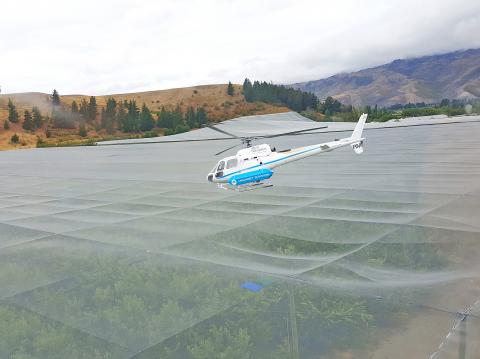New Zealand cherry producers are flying helicopters low over their orchards to dry off raindrops and protect thousands of tonnes of their product headed to Asia to feed rapidly growing demand from Lunar New Year revelers.
After Taiwan, China has grown to become the second-largest destination for New Zealand cherries in the past seven years. Together they take about 60 percent of New Zealand’s cherry exports, which were worth about NZ$43 million (US$30.98 million) last year.
Last week New Zealand exported 900 tonnes of cherries, the largest amount recorded in a one-week period.

Photo: Reuters
Exports are expected to grow to about NZ$50 million this season, said Tim Jones, chairman of Summerfruit NZ, which represents growers.
“The demand is phenomenal,” said Tracey Burns, who handles international cherry sales at produce exporter Freshmax.
Singapore Airlines said it is re-directing four cargo flights from Auckland to Christchurch this week to pick up 300 tonnes of cherries to be shipped to Taipei, Hong Kong and China.
Exporters and growers said they received constant requests for as much as fruit they could grow during Lunar New Year.
“I had a woman recently calling me up from China wanting 500 tonnes. We only do probably 50 tonnes in our orchard maximum, so I think she was dreaming a little bit,” said Martin Milne, a grower in the town of Cromwell.
All harvesting and sales take place in a two-and-a-half-month season starting in December, but the timeframe for Lunar New Year is even tighter: Growers have to deliver fruit by Monday next week, the deadline set by Asian distributors.
Growers in Central Otago — a mountainous region well-known as a backdrop in the Lord of the Rings films — are paying thousands of dollars per hour to fly helicopters over trees to stop rainfall from cracking fruit.
To ensure the good quality sought by Asian buyers, the choppers have been flying just 1m above the trees, operating like fans to blow away moisture left by recent rain.
“It’s a high-value, fast-moving crop which means it gets a lot less room for glitches like rain,” Summerfruit NZ chief executive officer Marie Dawkins said.
Growers were yesterday racing against forecasts predicting a severe incoming storm.
“At the end of the day the weather is what it is and you can’t do much about it except getting helicopters out,” Milne said.

Former Nicaraguan president Violeta Chamorro, who brought peace to Nicaragua after years of war and was the first woman elected president in the Americas, died on Saturday at the age of 95, her family said. Chamorro, who ruled the poor Central American country from 1990 to 1997, “died in peace, surrounded by the affection and love of her children,” said a statement issued by her four children. As president, Chamorro ended a civil war that had raged for much of the 1980s as US-backed rebels known as the “Contras” fought the leftist Sandinista government. That conflict made Nicaragua one of

BOMBARDMENT: Moscow sent more than 440 drones and 32 missiles, Volodymyr Zelenskiy said, in ‘one of the most terrifying strikes’ on the capital in recent months A nighttime Russian missile and drone bombardment of Ukraine killed at least 15 people and injured 116 while they slept in their homes, local officials said yesterday, with the main barrage centering on the capital, Kyiv. Kyiv City Military Administration head Tymur Tkachenko said 14 people were killed and 99 were injured as explosions echoed across the city for hours during the night. The bombardment demolished a nine-story residential building, destroying dozens of apartments. Emergency workers were at the scene to rescue people from under the rubble. Russia flung more than 440 drones and 32 missiles at Ukraine, Ukrainian President Volodymyr Zelenskiy

COMPETITION: The US and Russia make up about 90 percent of the world stockpile and are adding new versions, while China’s nuclear force is steadily rising, SIPRI said Most of the world’s nuclear-armed states continued to modernize their arsenals last year, setting the stage for a new nuclear arms race, the Stockholm International Peace Research Institute (SIPRI) said yesterday. Nuclear powers including the US and Russia — which account for about 90 percent of the world’s stockpile — had spent time last year “upgrading existing weapons and adding newer versions,” researchers said. Since the end of the Cold War, old warheads have generally been dismantled quicker than new ones have been deployed, resulting in a decrease in the overall number of warheads. However, SIPRI said that the trend was likely

‘SHORTSIGHTED’: Using aid as leverage is punitive, would not be regarded well among Pacific Island nations and would further open the door for China, an academic said New Zealand has suspended millions of dollars in budget funding to the Cook Islands, it said yesterday, as the relationship between the two constitutionally linked countries continues to deteriorate amid the island group’s deepening ties with China. A spokesperson for New Zealand Minister of Foreign Affairs Winston Peters said in a statement that New Zealand early this month decided to suspend payment of NZ$18.2 million (US$11 million) in core sector support funding for this year and next year as it “relies on a high trust bilateral relationship.” New Zealand and Australia have become increasingly cautious about China’s growing presence in the Pacific